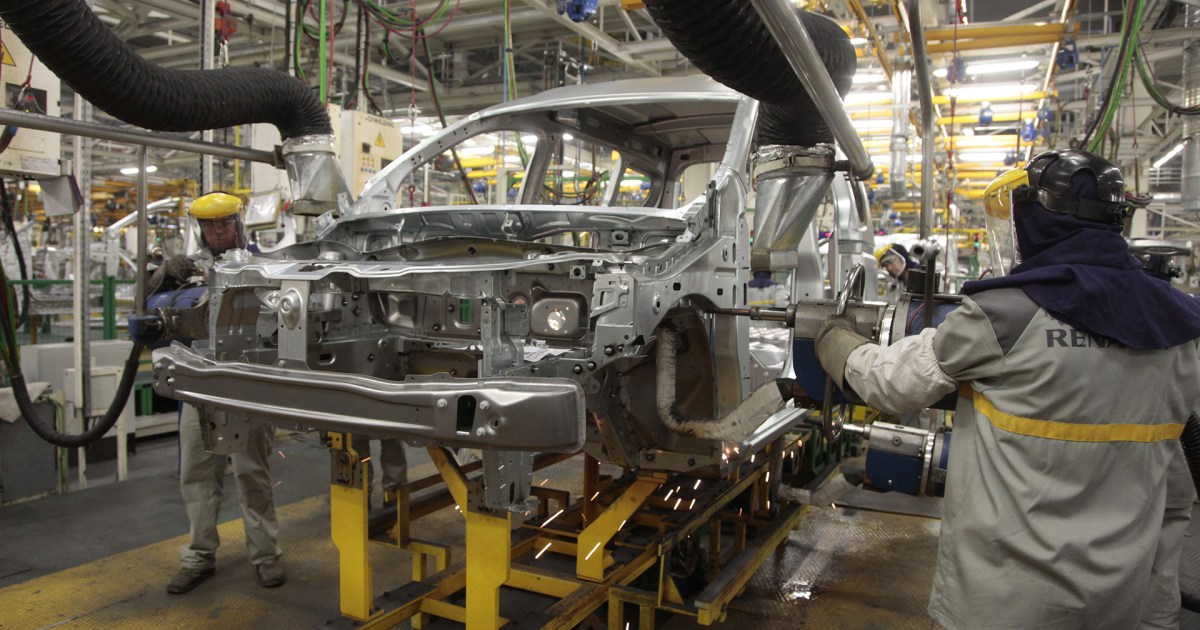The auto industry in Morocco has witnessed rapid development since the beginning of the new millennium, as the Moroccan auto industry has risen to sustainable growth levels of 20% annually, and the automobile industry has become a strategic sector in the industrial policy of the Kingdom of Morocco, and is achieving significant annual growth at the level of job creation and export. The sector creates more than 150,000 jobs, and is close to the export mark of 100 billion dirhams (one dollar equals 9.13 Moroccan dirhams).
My investment accelerated
In recent months, despite being a stage of crisis and a year of economic and commercial recession, there has been an acceleration in international industrial investments in the fields of cars in Morocco, as Morocco has attracted major international companies and leading brands.
On January 12, Morocco signed an agreement to set up 4 factories in the auto industry with the Japanese groups Yazaki and Sumitomo, with investments totaling 912 million dirhams that will provide 8,300 job opportunities.
Weeks earlier, the establishment of other factories was signed with partners and pioneering investors in the field, including the American factory "ADIENT" for original equipment for cars, which is making an investment by establishing a unit for the production of seat films (covers) and launching an industrial system for suppliers and a technical and engineering center, the value of which reached The total is about 19 million dollars (15.5 million euros), and will allow the creation of 1,600 jobs (jobs) and achieve an export turnover, worth 60 million euros (73 million dollars).
At the end of last December, the Dicastal Morocco Africa group, which produces aluminum wheels, inaugurated its second factory in the Industrial Acceleration Development Zone of Kenitra.
Automobile industry: 4 new plants for Japanese groups Sumitomo and Yazaki will create 8,300 direct jobs with a total investment of 912 million dirhams.
pic.twitter.com/8TW8hHLSYb
- Moulay Hafid Elalamy (@MyHafidElalamy) January 12, 2021
Export platform
Industry Minister Moulay Hafid El Alami stated that the new investments reflect the flexibility and adaptability of the Moroccan industry sector, and represent a sign of confidence in the Moroccan production platform, whose quality, performance and diversity provides global industry leaders with promising future and development prospects.
After signing the protocol of the agreement with the two Japanese companies, the minister said that Morocco is on its way to becoming the most competitive platform in the world in the automotive sector.
Alami added that Morocco is continuing to achieve this strategic goal by improving the level of integration and shifting towards carbon-free industrial production.
Morocco's position as a production and export terminal for equipment and cars is reinforced by the stability of foreign groups with international repute such as SAINT-GOBAIN, SEWS, YAZAKI, as well as DELPHI and BAMESA. (BAMESA), GMD, as well as SNOP and RENAULT, and the sector’s exports recorded a good performance in the first two months of the fourth quarter of 2020, an increase of 8.8%.
In an interview with Al-Jazeera Net, economic analyst Abd al-Nabi Abu al-Arab believes that Morocco is today one of the most important international platforms in the auto industry, and is firmly stationed at the international level, noting that it is the first at the African level.
Morocco has developed an integrated system of industries related to the auto sector, as it has 10 industrial systems linked to electrical wires, mechanics, batteries, seats and others.
Abu al-Arab believes that intensifying investments at the level of these micro-sectors related to the auto industry in a more comprehensive manner will enable Morocco to provide an integrated system for the manufacture of 100% Moroccan cars.
Competitive offer
Abu Al-Arab relates proportionally the high investment intensity and Morocco's success in providing the ecosystem with the high competitiveness of the sector at the international level, considering that Morocco occupies a good international position, especially in tax exemption offers and the provision of free zones, and assistance in the formation (preparation) of the necessary competencies. For the sector.
Morocco considers human resources formation a strategic field in the plan to accelerate industrial development 2014-2020, and the automotive sector aims to create a market for qualified human resources by establishing institutes for the auto industry and providing direct assistance in the formation of resources.
Abu al-Arab adds that among the indicators of the competitiveness of the Moroccan offer is the position of Morocco, which makes it an industrial platform for export to two of the most important international markets for consuming cars, the European and American markets, in addition to its presence on the gateway to the African market.
Abu al-Arab believes that Morocco is in a competitive position to respond to the African market, because it is internationally ranked in terms of manufacturing low-cost, economical cars.
Morocco still promises many competitive opportunities in the field of investing in the auto sector, and it has opportunities to gain shares in the American market given its availability on a free exchange agreement with it, and Morocco is currently betting on the formation of frameworks and qualified human resources capable of engaging in the general process of the sector or developing it, considering it. The key to moving to self-capacity in Moroccan industry for the sake of a local Moroccan brand is by raising the integration rate, which is still around 65%.

